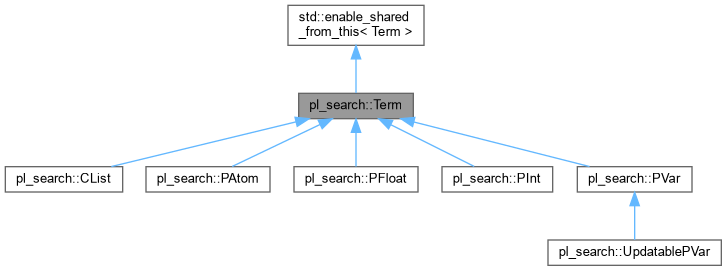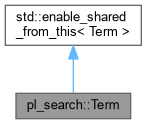Abstract base class for terms that approximate Prolog terms. More...
#include <term.hpp>


Public Member Functions | |
| virtual TermPtr | dereference () |
| Dereferences the term. The default is to return a shared pointer to term itself. | |
| virtual std::string | repr () const |
| Returns a string representation of the term. | |
| virtual bool | isLessThan (Term &t) const =0 |
| Checks if the term is less than another term. | |
| virtual bool | unifyWith (Engine *engine, TermPtr t) |
| A hook for unification of user-defined classes. Only override this method if you want to unify user-defined classes. | |
| virtual bool | is_var () |
| Checks if the term is a variable. | |
| Term () | |
| Default constructor. | |
| virtual | ~Term () |
| Virtual destructor for proper cleanup. | |
Protected Member Functions | |
| virtual bool | isEqualTo (Term &t) const =0 |
| Checks if the term is equal to another term. | |
| virtual Term * | deref_term () |
| Similar to dereference but returning the "raw" pointer. | |
Friends | |
| std::ostream & | operator<< (std::ostream &os, const Term &t) |
| Overloaded output stream operator for Term. | |
| bool | operator< (Term &t1, Term &t2) |
| < operator for Terms. | |
| bool | operator<= (Term &t1, Term &t2) |
| <= operator for Term | |
| bool | operator== (Term &t1, Term &t2) |
| == operator for Terms | |
Detailed Description
Abstract base class for terms that approximate Prolog terms.
The Term class provides an interface for Prolog-like terms. It includes methods for dereferencing, binding, resetting, and representing terms as strings. It also includes methods for comparing terms and unifying user-defined classes.
Constructor & Destructor Documentation
◆ Term()
|
inline |
Default constructor.
◆ ~Term()
|
inlinevirtual |
Virtual destructor for proper cleanup.
Member Function Documentation
◆ deref_term()
|
inlineprotectedvirtual |
Similar to dereference but returning the "raw" pointer.
- Returns
- A pointer to the dereferenced term. WARNING: This should only be used for testing as it returns the raw pointer of a shared_ptr.
Reimplemented in pl_search::PVar, and pl_search::UpdatablePVar.
◆ dereference()
|
inlinevirtual |
Dereferences the term. The default is to return a shared pointer to term itself.
- Returns
- A shared pointer to the dereferenced term.
Reimplemented in pl_search::PVar, and pl_search::UpdatablePVar.
◆ is_var()
|
inlinevirtual |
Checks if the term is a variable.
- Returns
- True if the term is a variable, false otherwise.
Reimplemented in pl_search::PVar.
◆ isEqualTo()
|
protectedpure virtual |
Checks if the term is equal to another term.
- Parameters
-
t The term to compare to.
- Returns
- True if the terms are equal, false otherwise.
Implemented in pl_search::CList, pl_search::PVar, pl_search::PAtom, pl_search::PFloat, and pl_search::PInt.
◆ isLessThan()
|
pure virtual |
Checks if the term is less than another term.
- Parameters
-
t The term to compare to.
- Returns
- True if the term is less than the other term, false otherwise.
Implemented in pl_search::CList, pl_search::PVar, pl_search::PAtom, pl_search::PFloat, and pl_search::PInt.
◆ repr()
|
inlinevirtual |
Returns a string representation of the term.
- Returns
- A string representation of the term.
Reimplemented in pl_search::CList, pl_search::PAtom, pl_search::PFloat, pl_search::PInt, and pl_search::PVar.
◆ unifyWith()
A hook for unification of user-defined classes. Only override this method if you want to unify user-defined classes.
- Parameters
-
engine Pointer to the Engine. t The term to unify with.
- Returns
- True if the unification is successful, false otherwise.
Friends And Related Symbol Documentation
◆ operator<
< operator for Terms.
Approximates the @< operator in Prolog. The ordering is as follows:
- pvar < pint, pfloat < patom < clist < user-defined classes;
- "older" vars are less than "newer" vars;
- patoms are ordered by name;
- pints and pfloats are ordered by value;
- clists are ordered by the first element, then the second, etc.
- Parameters
-
t1 The first term. t2 The second term.
- Returns
- True if the first term is less than the second term, false otherwise.
- Parameters
-
t1 The first term. t2 The second term.
- Returns
- True if the first term is less than the second term, false otherwise.
◆ operator<<
|
friend |
Overloaded output stream operator for Term.
- Parameters
-
os The output stream. t The term to output.
- Returns
- The output stream.
◆ operator<=
<= operator for Term
- Parameters
-
t1 The first term. t2 The second term.
- Returns
- True if the first term is less than or equal to the second term, false otherwise.
◆ operator==
== operator for Terms
- Parameters
-
t1 The first term. t2 The second term.
- Returns
- True if the terms are equal using the appropriate isEqualTo method, false otherwise.
- Parameters
-
t1 The first term. t2 The second term.
- Returns
- True if the terms are equal using the isEqualTo method, false otherwise.
The documentation for this class was generated from the following file:
- include/pl_search/term.hpp